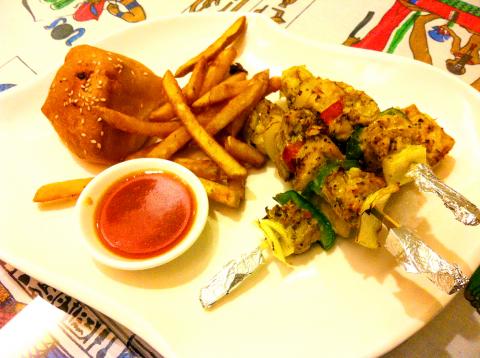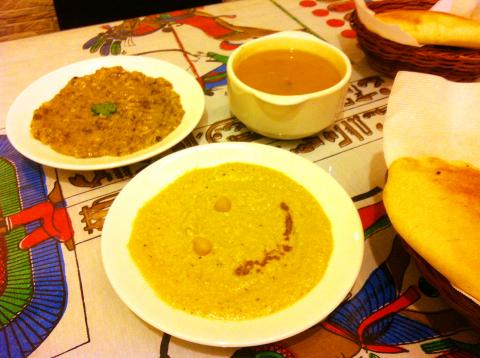With few restaurants in the city serving food that complies with Islamic traditions, Taipei can seem unfriendly to those who follow a halal diet. This is one reason Karim el-Nile opened Pharaohs, a restaurant and cafe serving Egyptian cuisine.
The establishment, which opened seven months ago on Taipei’s Taishun Street (泰順街), sports a modern wood-paneled decor and has the vibe of a casual, family-friendly cafe.
El-Nile, a 30-year-old Cairo native who married a Taiwanese and moved to Taipei almost three years ago, consulted with an Egyptian expat friend to come up with a modest menu of classic dishes from their native country.

Photo: David Chen, Taipei Times
For first-timers, El-Nile recommends the lamb stew with okra (NT$280), or Egyptian spicy beef stew with vegetables (NT$260), both of which are served with rice shaped in a pyramid (a novelty the kids will enjoy). He says these dishes are Egyptian versions of Moroccan tajine, a kind of stew slow-cooked in an earthenware pot. Pharaohs also offers beef (NT$160) and chicken shawarma (NT$160), the grilled meat that is a Middle Eastern fast food staple often served in a sandwich or wrap. El-Nile serves his with a homemade chipati-style flat bread.
On a visit earlier this week, our meal didn’t blow us away, but it did start and end well. For appetizers, we ordered freshly made hummus (NT$70) and baba ghanoush (labeled as eggplant salad on the menu). Served with warm flat bread (Arabian bread, NT$40) slightly thicker than a pita, the hummus had a creamy texture and was more satisfying than the baba ghanoush, which was nicely spiced but not quite thick enough. Or perhaps the hummus won because it was served with a smile: two chickpeas and a curved line of paprika made up the beaming face that topped our dish. The hearty lentil soup (NT$50 per bowl) was also well received, and together with the hummus and bread, would make a satisfying light meal.
The seekh chicken kebab (NT$220), whose name and curry marinade suggests an Indian or Pakistani flavor, is a recommended item on the menu, and one we didn’t regret ordering. The chicken was cooked just right — grilled and lightly charred on the outside and moist and tender on the inside. The meat is sliced into big, non-fatty chunks and skewered with onion and red, yellow and green peppers.

Photo: David Chen, Taipei Times
El-Nile says he has to strike a tricky balance with his recipes: he wants to please expats in the Muslim community and those familiar with Middle Eastern cuisine, but he also doesn’t want to alienate his Taiwanese customers. His solution is to make his fare “not too salty or oily” and to cut down on the sugar.
But maybe a little more of the bad stuff would have been better for the kofta dawood basha (NT$210), or beef meatballs served in a light tomato sauce with rice. We found the meatballs to be bland, although some might appreciate the unusual piquant sauce, which El-Nile says contains a “secret” blend of spices.
If you’ve been to Egypt and tried the local food, you might notice a few signature dishes missing from Pharaohs’ menu: falafel (which is said have originated in Egypt) and lamb kebabs. El-Nile says he plans to serve the latter in the near future; for now, falafel-lovers will have to stick with Sababa on Heping East Road (和平東路) to get their fix.
The friendly servers at Pharaohs wear fezes, which is vaguely charming, but it’s the milky-sweet rice pudding and rich panna cotta (NT$40 each) that will convince you to make a return trip.

Most heroes are remembered for the battles they fought. Taiwan’s Black Bat Squadron is remembered for flying into Chinese airspace 838 times between 1953 and 1967, and for the 148 men whose sacrifice bought the intelligence that kept Taiwan secure. Two-thirds of the squadron died carrying out missions most people wouldn’t learn about for another 40 years. The squadron lost 15 aircraft and 148 crew members over those 14 years, making it the deadliest unit in Taiwan’s military history by casualty rate. They flew at night, often at low altitudes, straight into some of the most heavily defended airspace in Asia.

Beijing’s ironic, abusive tantrums aimed at Japan since Japanese Prime Minister Sanae Takaichi publicly stated that a Taiwan contingency would be an existential crisis for Japan, have revealed for all the world to see that the People’s Republic of China (PRC) lusts after Okinawa. We all owe Takaichi a debt of thanks for getting the PRC to make that public. The PRC and its netizens, taking their cue from the Chinese Communist Party (CCP), are presenting Okinawa by mirroring the claims about Taiwan. Official PRC propaganda organs began to wax lyrical about Okinawa’s “unsettled status” beginning last month. A Global

Taiwan’s democracy is at risk. Be very alarmed. This is not a drill. The current constitutional crisis progressed slowly, then suddenly. Political tensions, partisan hostility and emotions are all running high right when cool heads and calm negotiation are most needed. Oxford defines brinkmanship as: “The art or practice of pursuing a dangerous policy to the limits of safety before stopping, especially in politics.” It says the term comes from a quote from a 1956 Cold War interview with then-American Secretary of State John Foster Dulles, when he said: ‘The ability to get to the verge without getting into the war is

Like much in the world today, theater has experienced major disruptions over the six years since COVID-19. The pandemic, the war in Ukraine and social media have created a new normal of geopolitical and information uncertainty, and the performing arts are not immune to these effects. “Ten years ago people wanted to come to the theater to engage with important issues, but now the Internet allows them to engage with those issues powerfully and immediately,” said Faith Tan, programming director of the Esplanade in Singapore, speaking last week in Japan. “One reaction to unpredictability has been a renewed emphasis on